
Dominic
Vautier 1/7/2011
And through the fields of
clover,
We’ll drive up to Dover
on our golden wedding day.[1]
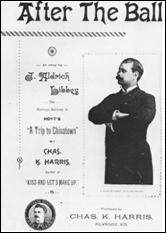
Grover Cleveland regained his presidency, the only president to serve two non-consecutive terms and the first and only president to successfully father children while serving as chief executive.
I feel that the age of American popular music began with the huge success of Charlie Harris’s After the Ball. Popular music was no longer a little fish in a big pond. Sales of this song earned Charlie Harris 5 million dollars over the next several years.
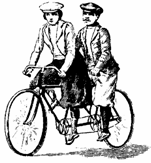 This
year marked the beginning of a dominance that Tin Pan Alley held over
the sheet music industry which would continue unabated for almost 25
years.
This
year marked the beginning of a dominance that Tin Pan Alley held over
the sheet music industry which would continue unabated for almost 25
years.
As if After the Ball wasn’t enough another song Daisy Bell came peddling onto the scene. The song was possibly prompted by the increased interest in the “wheel”, which was all the rage. In any case the song added fuel to the bicycle fire?
London
Gaiety Girls invade
the Black Maria
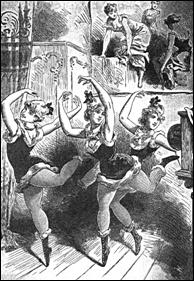 Asa Chandler bought the rights to
Coca-Cola. The drink relied
on use of cocaine for its stimulating side effects. Some doctors then observed that the drug might be addictive, but
people bought it anyway.
Asa Chandler bought the rights to
Coca-Cola. The drink relied
on use of cocaine for its stimulating side effects. Some doctors then observed that the drug might be addictive, but
people bought it anyway.
Edison opened a studio for motion pictures at West Orange New Jersey. He called his new studio “The Black Maria” because it looked like a paddy wagon.
John Philip Sousa retired from the
Marine Corps and started his own band
which turned out to be a big success for the next 20 years.
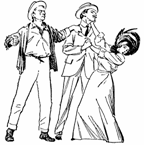 There was no place that struck more
fear into the hearts of New Yorkers at night than that district called The Bowery.
Extending
on lower 3rd Avenue
from Chatham Square
to Cooper Square, it became an unwholesome place after 1870, as the rich moved away for
safer and more fashionable residences to the north.
There was no place that struck more
fear into the hearts of New Yorkers at night than that district called The Bowery.
Extending
on lower 3rd Avenue
from Chatham Square
to Cooper Square, it became an unwholesome place after 1870, as the rich moved away for
safer and more fashionable residences to the north.
Charles Hoyt wrote the score for A Trip to Chinatown, a play about Chinatown in San Francisco but when he added a song about The Bowery it became a New York play and turned out to be a huge success. Shopkeepers who lived in the Bowery were not at all pleased and resented the bad press. They ran for 650 performances which didn't do The Bowery any good.
The bow’ry, the bow’ry!
They say such things
And they do strange things
On the bow’ry, the bow’ry
I’ll never go there anymore.
Other memorable songs this year were: The Man who Broke The Bank at Monte Carlo, and Jim Thornton’s My Sweetheart’s the Man In the Moon.
Bell made his first long distance call from New York to Boston. A new era of communication was born.
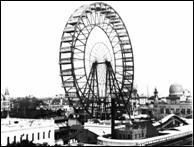 The
World Colombian Exposition opened in
Chicago
commemorating the 400th anniversary of the discovery of America. It was the first fair to
turn a profit, although just barely. The fair boasted a receipt count of
21 million, but actual attendance was probably a lot more, since people
went back many times, jumped the turn styles, or were admitted as
performers, reporters, politicians, guests and whatever else. The fair’s network of canals and artificial lagoons used waters
of nearby Lake Michigan. Inventions, such as the
phonograph, linotype, and Pullman cars were on display, but the main
attraction by far was George Ferris’ wheel with all it’s 32
cars--terrifying but irresistible.
The
World Colombian Exposition opened in
Chicago
commemorating the 400th anniversary of the discovery of America. It was the first fair to
turn a profit, although just barely. The fair boasted a receipt count of
21 million, but actual attendance was probably a lot more, since people
went back many times, jumped the turn styles, or were admitted as
performers, reporters, politicians, guests and whatever else. The fair’s network of canals and artificial lagoons used waters
of nearby Lake Michigan. Inventions, such as the
phonograph, linotype, and Pullman cars were on display, but the main
attraction by far was George Ferris’ wheel with all it’s 32
cars--terrifying but irresistible.
Sandow's fig leaf pose
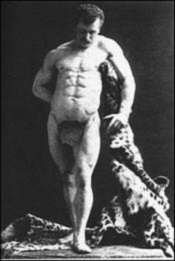
Also at the World’s Fair, Florenz Ziegfield sponsored his first performance featuring the famous strongman Eugene Sandow. It would be another 5 years before Ziegfeld decided that girls drew bigger crowds than fig-leafed men.
A financial panic occurred this year that left many people homeless and poor. It brought women into the workforce and started to change the social equation.
Mildred and Patty Hill, two Louisville,
Ky.
schoolteachers wrote The Happy
Birthday song for their students to sing first thing in the morning.
It was originally called Good Morning to All. They
had no idea that it would become the most frequently sung music in
Little Egypt doing her
snake dance
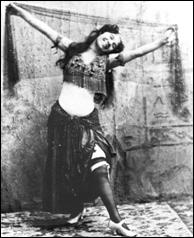 At the Chicago World’s Fair the Indian snake dance, better known as
the Hootchy-kootchy was a favorite attraction. Little Egypt, who performed, or more correctly, wiggled her way to stardom, was
billed as the "naughtiest girl in America." Subsequently, Jim
Thornton, seeing an opportunity to capitalize on this event wrote a song
called She Never Saw the Streets of Cairo, which was a take off on Little
Egypt, who had never left the
United States. Rossiter published Thornton
's song, and it was said that the first 2 thousand copies featured a
picture of Little Egypt on the cover. Rossiter, fearing legal action, quickly recalled and
destroyed much of the sheet music, but several hundred copies were
already sold. To this day,
collectors have never been able to find a single copy of the now
priceless, "Little Egypt" edition of Jim Thornton’s Hootchy-kootchy
song.
At the Chicago World’s Fair the Indian snake dance, better known as
the Hootchy-kootchy was a favorite attraction. Little Egypt, who performed, or more correctly, wiggled her way to stardom, was
billed as the "naughtiest girl in America." Subsequently, Jim
Thornton, seeing an opportunity to capitalize on this event wrote a song
called She Never Saw the Streets of Cairo, which was a take off on Little
Egypt, who had never left the
United States. Rossiter published Thornton
's song, and it was said that the first 2 thousand copies featured a
picture of Little Egypt on the cover. Rossiter, fearing legal action, quickly recalled and
destroyed much of the sheet music, but several hundred copies were
already sold. To this day,
collectors have never been able to find a single copy of the now
priceless, "Little Egypt" edition of Jim Thornton’s Hootchy-kootchy
song.
Helene Mora
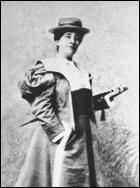
Helene Mora, the accomplished female baritone[2] popularized “Au Revoir” but not “Good-bye’’, a song written by her friend Harry Kennedy who died before the decade was out leaving Mora heartbroken. Helene was considered by many the first true torch singer, although that term would not be coined for another 30 years. The “Au Revoir” “ song (pronounced av-wa) was perhaps the first good close-harmony barbershop song written, even though I’ll Take You Home Again, Cathleen was to become the eternal favorite among barbershop quartets.
Fire destroyed most of the Chicago exposition. None of the buildings could be salvaged.
Isabella Hooker, Elizabeth Stanton, and Susan Anthony appeared before a senate committee on behalf of women’s suffrage. The previous year Colorado granted women voting rights, following the trend set by Wyoming and Utah.
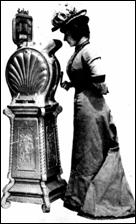 Moving pictures began showing bare
ankles. A kinetoscope parlor
at 1155 Broadway, New York was opened on April 14. The
parlor contained 10 machines showing such things as barber shop,
trapeze, and other features. One New Jersey senator, James Bradley, was totally shocked when he spotted a bare ankle
in one of the films. His
complaints prompted the mayor to order the peep show immediately shut
down or the objectionable material removed.
Moving pictures began showing bare
ankles. A kinetoscope parlor
at 1155 Broadway, New York was opened on April 14. The
parlor contained 10 machines showing such things as barber shop,
trapeze, and other features. One New Jersey senator, James Bradley, was totally shocked when he spotted a bare ankle
in one of the films. His
complaints prompted the mayor to order the peep show immediately shut
down or the objectionable material removed.
Felix McGlennon re-released the ballad And her Golden Hair was Hanging Down Her Back under the capable editing of Monroe Rosenfeld who was more affectionately known as “Rosey” on the Alley. Golden Hair was a complete hit on its second release and caused much of a scandal. Decent girls did not wear their hair down.
It was a hot and lazy summer in
The immortal camp song I’ve been Working on the Railroad came out during the summer and from that moment all camp fires the world over featured Dinah blowing her horn.
Lottie
Gilson
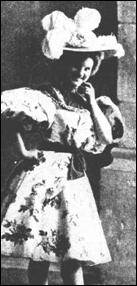
The
first ever revue opened at the Casino Theater in
Lottie Gilson, better known as the “Little Magnet’ and also considered the greatest of the female baritones, introduced On the Sidewalks of New York at the Old London Theater in the Bowery. The song was an immediate hit. Some years earlier Gilson had met Harry Von Tilzer when she was on tour in Chicago in 1889. She convinced the aspiring actor that his real talent lay in his uncanny songwriting ability and that he should make it to New York where he was sure to find true fame and fortune. She was right. He did.
The New York World was the first newspaper to print color comics.
The Supreme Court ruled that income tax was unconstitutional and that New York had to return all the money it had illegally collected.
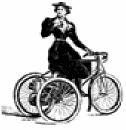 Bicycle
sales were going wild. The
“silent steeds’ were rolling out of the doors of bicycle shops.
However proper and social-minded ladies continued to use the
tricycle. They refused to
ware divided skirts or even worse, the scandalous bloomers. Nonetheless, hemlines came up several inches to keep the skirt
out of the bicycle chain and spokes. Younger ladies preferred the bloomer.
Bicycle
sales were going wild. The
“silent steeds’ were rolling out of the doors of bicycle shops.
However proper and social-minded ladies continued to use the
tricycle. They refused to
ware divided skirts or even worse, the scandalous bloomers. Nonetheless, hemlines came up several inches to keep the skirt
out of the bicycle chain and spokes. Younger ladies preferred the bloomer.
The Widow Jones opened at the Bijou Theater in New York featuring what some considered the first ragtime song ever performed before a public audience. It was called The Bully Song and was sung by none other than the incomparable Miss May Irwin. She apparently borrowed the lusty tune from her friend Charlie Trevathan, who had in turn picked it up while visiting the resort of Babe Connors in St. Louis. Five years earlier Babe Connors’ establishment was responsible for Ta-Ra-Ra-Boom-De-Ay, a song also considered by some to be ragtime. The Bully Song however did need a new set of lyrics because the words initially provided by Mr. Trevathan were much too raw for public consumption. The Widow Jones was publicly denounced because it contained the extremely scandalous 20 second kiss.
Lillian Russell - 1891
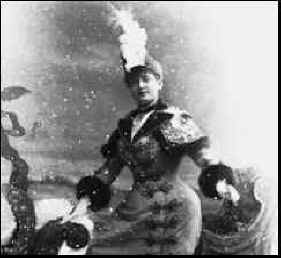 Although
1895 was a fairly good year for new popular music, not much of it has stood
the test of time. The
country was still in the throws of After
the Ball, and other songs written during the three preceding
years.
Although
1895 was a fairly good year for new popular music, not much of it has stood
the test of time. The
country was still in the throws of After
the Ball, and other songs written during the three preceding
years.
Lillian Russell was by this time the darling of American Stage. After working in Tony Pastor’s for several years she had attained the title of “The American Beauty.” Still a young woman she had already been married and divorced three times. Her liaison with rich financier “Diamond Jim” Brady was legendary.
The huge hit of the year was The Band Played On which described a lovesick Romeo totally in taken with a blonde.
The Streets of Cairo or the “Hootchy-kootchy” song as it was known continued to be performed.
This year and 1898 were the two most prolific times for sheet music production. More popular hits came along these two years than during any other period.
Audiences flocked to the “flickers,” better known today as the “movies.” The Lumiere Cinematograph made its grand opening in New York at Keath’s Union Square Theater. Some of the scenes were so realistic, such as the waves breaking on a pier that spectators in the front row thought they might get wet.
Cakewalks became the dance of the day.
W. J. Bryan made his famous cross of gold speech and also won the Democratic Party’s nomination for president. “You shall not press down upon the brow of labor this crown of thorns” he said. He lost anyway.
Maude
Nugent
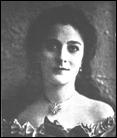 Utah
joined the union as the 45th state.
Utah
joined the union as the 45th state.
Maude Nugent was the first woman to write a hit song. She did the words and music to Sweet Rosie O’Grady, which made the charts that summer. Many people felt that her husband Billy Jerome had actually written the song but the allegation was never proven. Nugent did, after all, write other songs.
This year produced the first pornographic movie, at least in the eyes of many prominent politicians, clergy, and social lions. Thomas Edison released a film called The Kiss. It consisted of a 20 second kissing scene from a play called The Widow Jones staring John Rice and May Irwin. Theaters were picketed by protestors but people came in droves to see the 20 second kiss anyway.
The first modern Olympic games were held in Greece. It was well over 2000 years since last performed. The first American to win a gold medal was James B. Connolly in the triple jump. He was really hopping along.
McKinley Beat Brian for President in a heated campaign over monitory policy.
Flo Ziegfield directed his first revue. It was called A Parlor Match and featured his live-in lover Anna Held. Although not a striking beauty like Lillian Russell, she had a sensuous suggestiveness that dazzled the crowd. Anna was known for her 18-inch waist and her milk baths. It was even rumored that she had a rib removed--an acceptable Victorian practice--to give her such a slender waist.
Harry Dacre of Daisy Bell fame wrote Elsie from Chelsea (of course pronounced shell-see). Even though he was talking about London, the song came to refer to the Chelsea district of Boston.
A Hot Time in The Old Town Tonight had nothing to do with war or any war for that matter. Ted Metz wrote it two full years before the Spanish American War. Ten years later, the song had been proclaimed the unofficial Spanish-American war song, but Teddy Roosevelt asked that the song be stricken from the historical record because it was ragtime and not real music.[4]
Emogene Comer
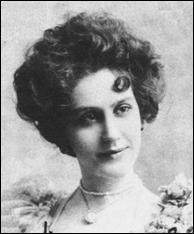 Imogene Comer, the best
known of the female baritones of vaudeville popularized Gussie Davis’
In The Baggage Coach Ahead. It
was said that she could bring a tear to every eye, and this song was
certainly no exception.
Imogene Comer, the best
known of the female baritones of vaudeville popularized Gussie Davis’
In The Baggage Coach Ahead. It
was said that she could bring a tear to every eye, and this song was
certainly no exception.
Lottie Gilson sang You’re not The Only Pebble on The Beach which became the common American expression of the day.
Gold was discovered in the Klondike and the race was on. Seattle docks were ablaze with excitement because miners were racing to stake out claims. My grandfather was among them but he never made a dime.
“Yes Virginia, there is a Santa Claus.” A young girl Virginia O’Hanlin was assured that Santa was real.
Ben Harney published The Ragtime Instructor where he demonstrated the art of syncopation. Everyone could learn how to write and play ragtime.
Charlie Harris again hit gold with his Break the News to Mother, a song that he reportedly wrote down on one of his beautifully tailored detachable linen cuffs during a performance of the civil war play Secret Service. The play must have been inspirational.
Kerry Mills couldn’t get At a Georgia Camp Meeting published by anybody so he decided to start his own publishing business and do it himself. The song was very successful.
After years of trying Monroe Rosenfeld finally got a hit of his own. It was called Take Back Your Gold, I Don’t Care if You Never Come Back. With a title like that how could he miss!
Jim Thornton wrote When I Took the Keeley Cure. It didn’t work because he kept drinking.
New York and Brooklyn became one city. Brooklynites felt that New York city should be named Brooklyn.
This year was the most productive ever for songwriting in the history of Tin Pan Alley although few of the songs are remembered today. There were probably 15 big sellers this year including such complete forgettables as: Goodnight Little Girl Goodnight, The Rosary, The Boy Guessed Right, and so many others.
Jim Thornton's wife Bonnie
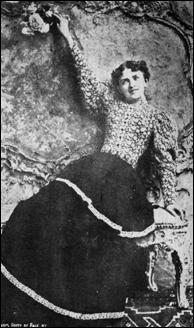 The
warship Maine
blew up as the result of a coal fire. William Randolph Hearst decided that since it was a slow
news year, maybe a war would be a good thing to have. So he blamed the Spanish and got his war.
The
warship Maine
blew up as the result of a coal fire. William Randolph Hearst decided that since it was a slow
news year, maybe a war would be a good thing to have. So he blamed the Spanish and got his war.
U.S. declared war on Spain and Admiral Dewey quickly destroyed the Spanish fleet in Manila Bay. Harry Von Tilzer wrote about it with My Old New Hampshire Home so he could pay his rent. The Rough Riders without any horses overrun San Juan Hill and the “Splendid Little War” was over.
Emile Berliner set up the first disk recording company Deutsche Gramaphone.
One song made this year that is actually still remembered was Jim Thornton’s When You Were Sweet Sixteen, a song about his wife Bonnie.
Two great songs appear this year, Hello! My Baby, and Maple Leaf Rag, the first in popular ragtime, the second in classic ragtime.
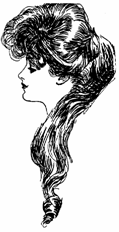
Gibson Girls set the fashion trend for women. She made her first appearance in a book of sketches by Charles Dana Gibson called The Education of Mr. Pipp. Gibson said he drew his character to represent the ideal woman. She was buoyant, charming, atheletic, kind and winsome. This interesting phenomenon was certainly an identifiable and eagerly followed cartoon creations of its day. Every woman in the country wanted to be a Gibson Girl.
Mandy Lee broke everybody’s heart.
Sales of My Wild Irish Rose went wild.
Indiana got a new state song with Dresser’s On the Banks of the Wabash.
The word “conspicuous consumption” was a term invented by Thorstein Veblen, professor at the University of Chicago to describe the vulgar practices of America’s new rich.
To continue Chronicles 1901-1915
Here are some other links in this article:
Origins of Early Popular Music
Minstrelsy
Broadway
Vaudeville
Other sources
People Growth - the First Baby Boom and it's effect
[1]
Stanley Murphy and Percy Wenrich, Put
On Your Old Gray Bonnet, 1909.
[2]
Female baritone referred to a type of exaggerated singing done by
female altos. They were
not baritones at all but used a lot of bravado and theatrics to
accompany their songs.
[3]
Originally known as Ta-Ra-Ra-Boom-Der-E.
[4]
Gilbert, 213.
[5] I have a copy of May Irwin's
Frog Song on victor 5156. She could really sing.